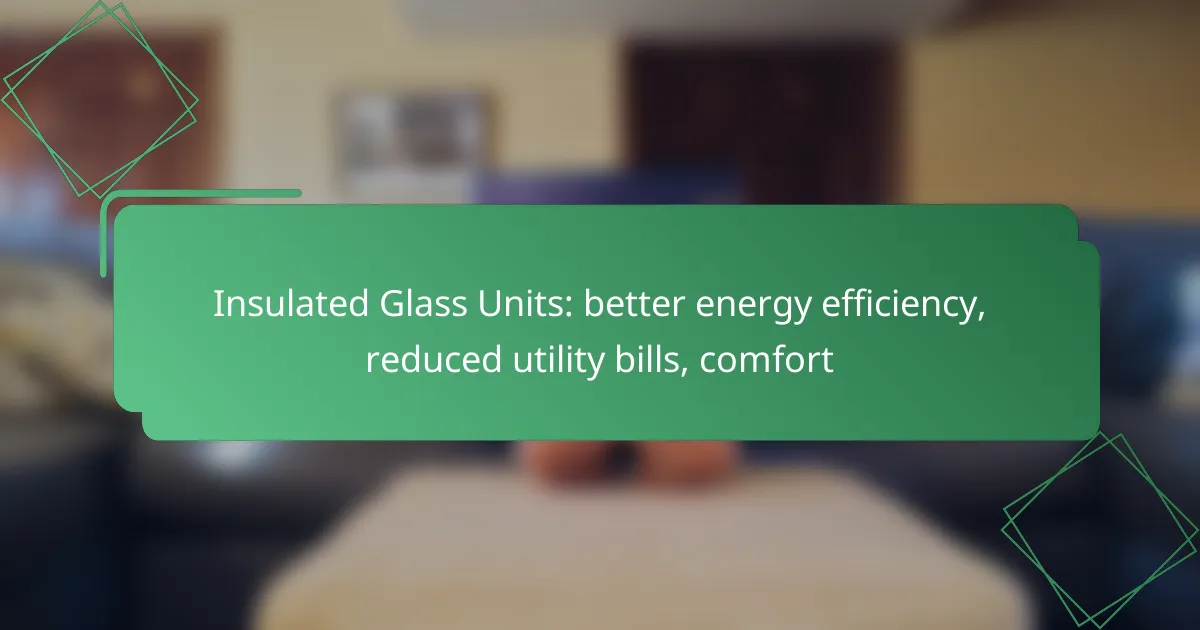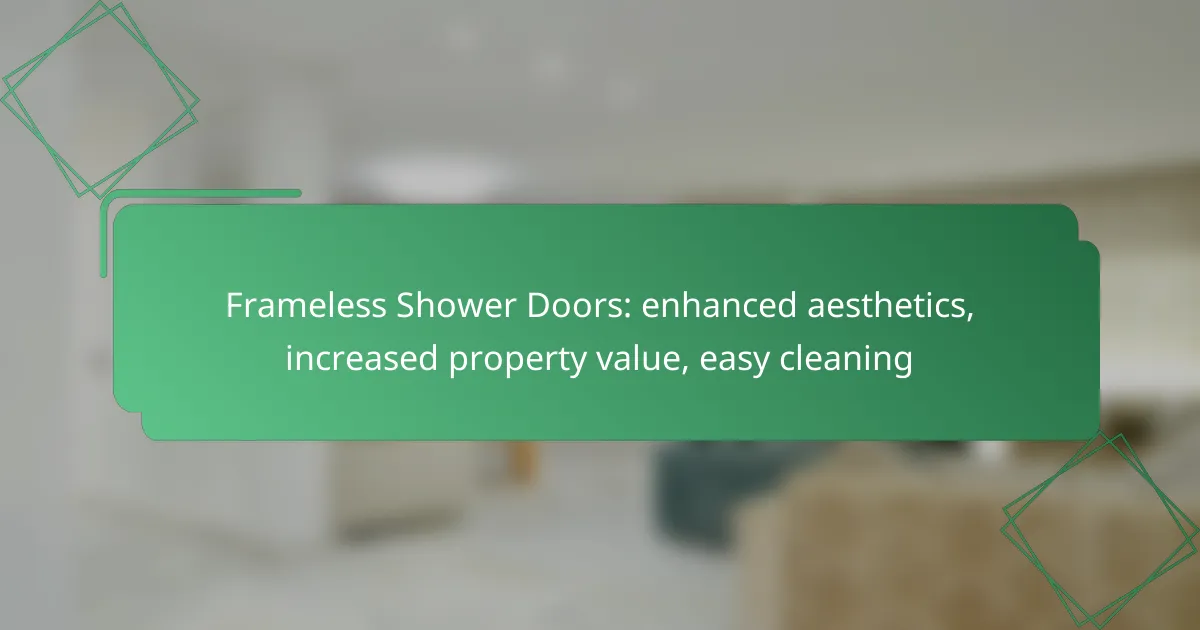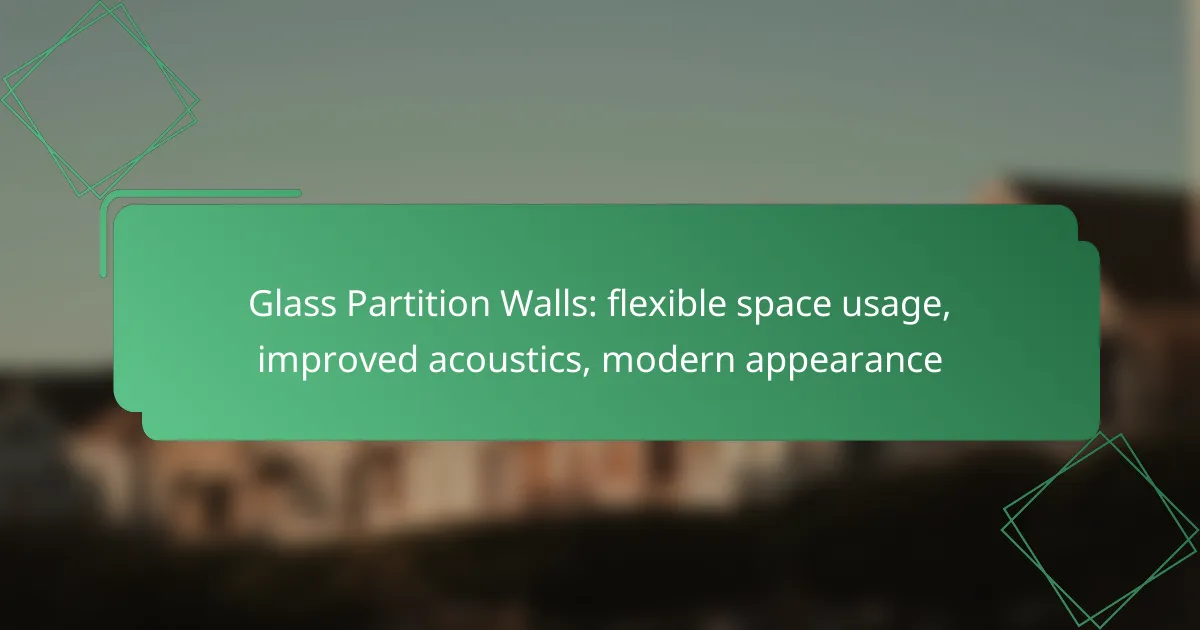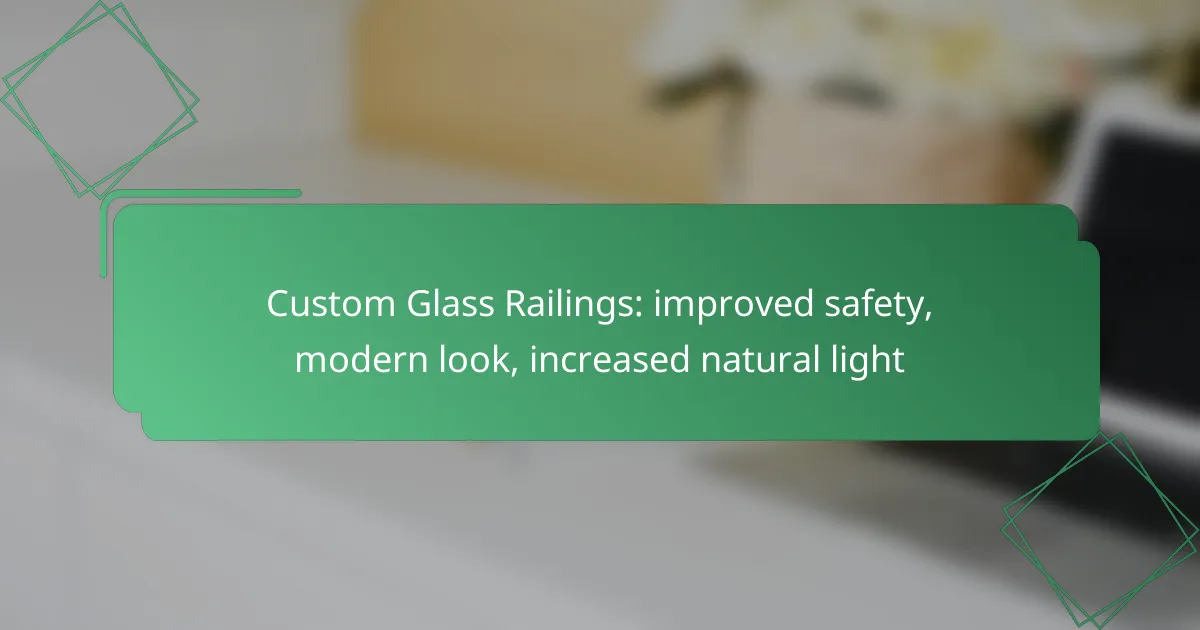Insulated glass units (IGUs) are designed to improve energy efficiency by minimizing heat transfer, resulting in lower utility bills and enhanced comfort in homes. By providing better thermal performance, IGUs help maintain a stable indoor environment, making living spaces more enjoyable, especially during extreme weather conditions.

How do insulated glass units improve energy efficiency in Canada?
Insulated glass units (IGUs) enhance energy efficiency in Canada by minimizing heat transfer and improving thermal performance. This results in lower utility bills and increased comfort in homes, particularly during extreme weather conditions.
Reduced heat transfer
Insulated glass units are designed with multiple panes of glass separated by a spacer and filled with inert gas, such as argon or krypton. This construction significantly reduces heat transfer between the interior and exterior of a building. In Canada, where winters can be harsh, this feature helps maintain a stable indoor temperature, reducing the need for excessive heating.
By limiting heat loss in winter and heat gain in summer, IGUs contribute to a more comfortable living environment. Homeowners can expect a noticeable difference in temperature regulation, leading to less reliance on heating and cooling systems.
Lower energy consumption
With reduced heat transfer, insulated glass units lead to lower energy consumption for heating and cooling. This can result in energy savings of around 20-30% compared to single-pane windows. In a Canadian context, this translates to significant savings on monthly utility bills, especially during peak heating months.
Choosing IGUs can also qualify homeowners for energy efficiency rebates or incentives offered by local governments, further enhancing the financial benefits of upgrading windows.
Enhanced insulation properties
The insulation properties of insulated glass units are superior to traditional window options. The combination of multiple glass panes and gas fills creates a barrier that minimizes thermal bridging. This means that not only does the glass itself insulate, but the entire window unit performs better in maintaining indoor temperatures.
For optimal performance, homeowners should ensure that the IGUs are properly installed and sealed. Poor installation can negate the benefits of the insulation properties, leading to drafts and increased energy costs. Regular maintenance checks can help preserve the integrity of the units over time.

What are the cost benefits of insulated glass units?
Insulated glass units (IGUs) provide significant cost benefits through improved energy efficiency, leading to lower utility bills and long-term savings. By minimizing heat transfer, these units enhance comfort while reducing the overall energy consumption of a building.
Lower utility bills
One of the primary advantages of insulated glass units is their ability to lower utility bills. By reducing the amount of heat lost in winter and heat gained in summer, IGUs help maintain a stable indoor temperature, which can lead to savings of 10-30% on heating and cooling costs. Homeowners can expect to see noticeable reductions in their monthly energy expenses.
To maximize these savings, ensure that the IGUs are properly installed and sealed. Poor installation can negate the benefits, leading to drafts and increased energy consumption.
Long-term savings on energy costs
Investing in insulated glass units can lead to substantial long-term savings on energy costs. While the initial investment may be higher than standard single-pane windows, the return on investment often becomes evident within a few years due to decreased energy bills. Over time, these savings can accumulate significantly, making IGUs a financially sound choice.
Consider that the lifespan of insulated glass units typically ranges from 20 to 30 years, meaning that the energy savings can far exceed the upfront costs. Additionally, many regions offer incentives or rebates for energy-efficient upgrades, further enhancing the financial benefits.
Increased property value
Insulated glass units can also increase property value, making them an attractive investment for homeowners. Properties equipped with energy-efficient features, such as IGUs, often appeal to buyers looking for lower operating costs and enhanced comfort. This can lead to a higher resale price compared to similar homes without these upgrades.
When considering selling a property, highlighting the energy efficiency and comfort benefits of insulated glass units can be a strong selling point. Buyers are increasingly aware of energy costs, and having IGUs can set a property apart in a competitive market.
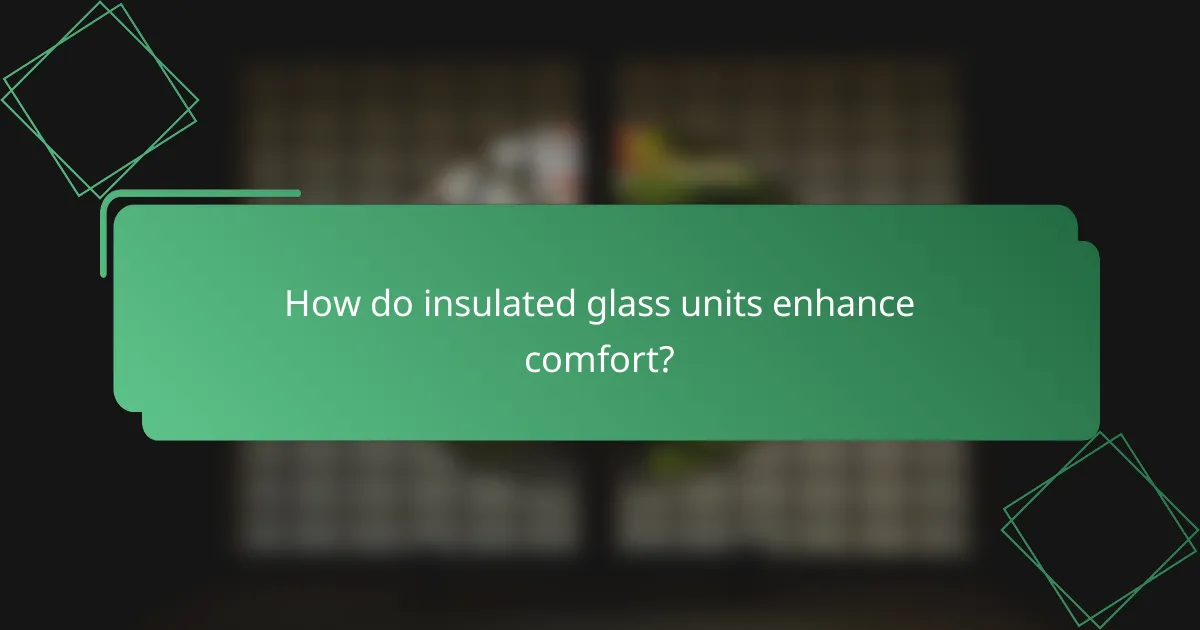
How do insulated glass units enhance comfort?
Insulated glass units (IGUs) significantly enhance comfort by providing better thermal performance, reducing noise, and minimizing condensation. These benefits lead to a more stable indoor environment, allowing occupants to enjoy their spaces without the distractions of temperature fluctuations or outside disturbances.
Improved indoor temperature stability
Insulated glass units improve indoor temperature stability by creating a barrier that reduces heat transfer. This means that during hot summers or cold winters, the temperature inside remains more consistent, reducing the need for heating or cooling systems to work overtime.
For example, IGUs can help maintain indoor temperatures within a comfortable range of about 20-22°C (68-72°F) while minimizing energy consumption. This stability not only enhances comfort but also contributes to lower utility bills.
Reduced noise pollution
Insulated glass units effectively reduce noise pollution by incorporating multiple panes of glass separated by an insulating layer. This design dampens sound waves, making it easier to enjoy peace and quiet indoors, especially in urban environments or near busy roads.
Research indicates that IGUs can reduce noise transmission by up to 50%, making a noticeable difference in daily comfort. For those living in noisy areas, this can be a crucial factor in choosing windows.
Less condensation
Insulated glass units help minimize condensation on window surfaces by maintaining a warmer interior surface temperature. This is particularly important in climates with high humidity, where condensation can lead to mold growth and damage to window frames.
By reducing condensation, IGUs contribute to a healthier indoor environment and prolong the lifespan of window installations. Homeowners should consider IGUs to enhance comfort and protect their property from moisture-related issues.

What factors should be considered when choosing insulated glass units?
When selecting insulated glass units (IGUs), consider factors such as energy efficiency, climate compatibility, and frame suitability. These elements directly impact your home’s comfort, utility costs, and overall performance of the windows.
Climate considerations in Canada
In Canada, the climate varies significantly, influencing the choice of insulated glass units. For colder regions, look for IGUs with a higher R-value to ensure better insulation against the cold. In contrast, warmer areas may benefit from units that reflect heat while still allowing natural light.
Additionally, consider the local weather patterns, such as humidity and snowfall, which can affect the durability and performance of the glass. Selecting IGUs with appropriate seals and coatings can enhance their longevity in harsh conditions.
Frame compatibility
Choosing insulated glass units also requires attention to frame compatibility. Different frame materials, such as wood, vinyl, or aluminum, can affect the performance of the IGUs. Ensure that the frame can accommodate the thickness and weight of the chosen glass units.
It’s crucial to verify that the frame provides adequate insulation and minimizes thermal bridging. Frames with built-in thermal breaks can improve energy efficiency, making them a better choice for IGUs.
Glass coatings and treatments
Glass coatings and treatments play a vital role in the performance of insulated glass units. Low-emissivity (Low-E) coatings can significantly reduce heat transfer, enhancing energy efficiency. These coatings reflect infrared light, keeping homes warmer in winter and cooler in summer.
Additionally, consider options like tinted glass or reflective coatings, which can help control glare and improve privacy. Always check the manufacturer’s specifications to ensure that the coatings are suitable for your climate and meet local building codes.
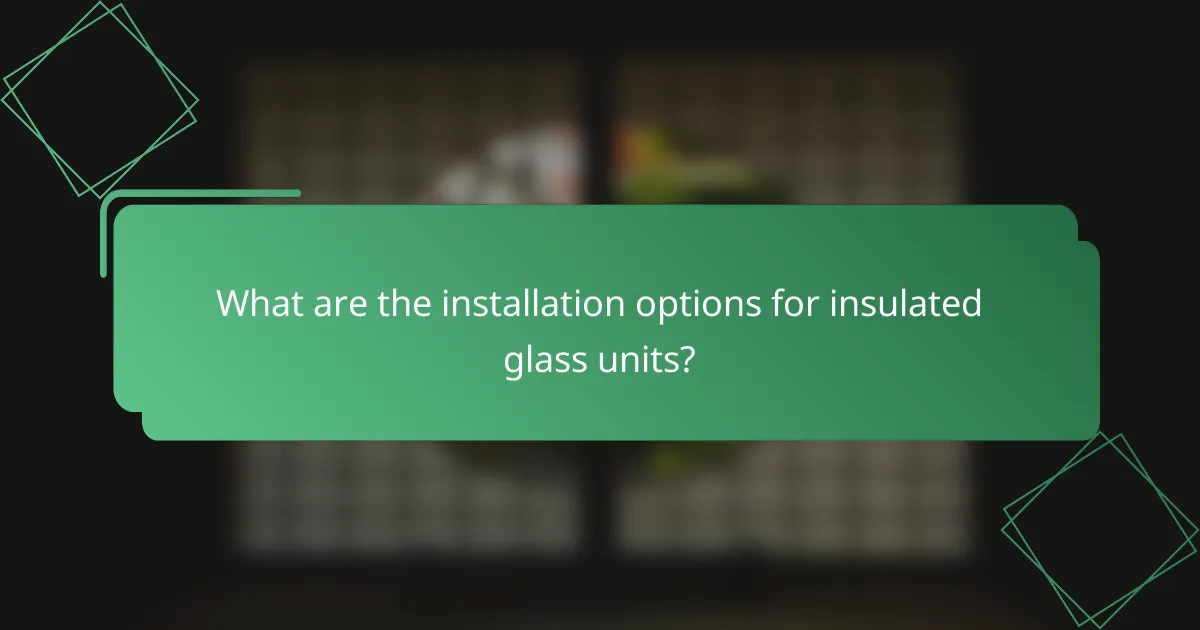
What are the installation options for insulated glass units?
Insulated glass units (IGUs) can be installed in various ways, depending on whether you are upgrading existing windows or starting new construction. Understanding these options helps you choose the best approach for energy efficiency and comfort.
Retrofit existing windows
Retrofitting involves replacing the glass in your current window frames with insulated glass units. This option is often more cost-effective than full window replacement and can significantly improve energy efficiency. Ensure that your existing frames are in good condition to support the new IGUs.
When retrofitting, consider factors such as the thickness of the new glass and the type of spacer used, as these can affect thermal performance. It’s advisable to consult with a professional to assess compatibility and installation requirements.
New construction applications
For new construction, insulated glass units can be integrated directly into the design of windows. This allows for greater flexibility in selecting frame materials and styles, optimizing both aesthetics and energy performance. Builders often choose IGUs to meet energy codes and enhance the overall comfort of the home.
When planning new construction, consider the orientation of the building and local climate, as these factors influence the effectiveness of the insulated glass. Selecting the right low-E coatings can further enhance energy efficiency.
Professional installation services
Hiring professional installation services for insulated glass units ensures that the units are properly fitted and sealed, maximizing their energy efficiency. Professionals have the expertise to handle various window types and can address any structural issues that may arise during installation.
When selecting a contractor, look for those with experience in installing IGUs and check for certifications or warranties. Proper installation can prevent common problems such as air leaks or condensation, which can undermine the benefits of insulated glass.






